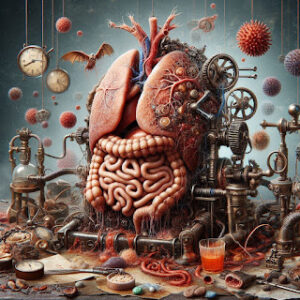 |
| Image created by Dr. Michael J. Miller |
Brisbane-based startup Microbio, which developed a rapid diagnostic test that detects 26 sepsis-causing pathogens from blood in under three hours, has partnered with Queensland’s Advanced Robotics Manufacturing (ARM) Hub to centralise its database and leverage AI for deeper insights into the effectiveness of its biotechnology.
Founded in 2017 by Dr Flavia Huygens and Paul Carboon, Microbio offers a pathogen test known as InfectID-BSI, which can identify 26 sepsis-associated bacteria and yeast species, requiring 0.4ml of whole blood and three hours of laboratory time.
Over the last eight months, the company has secured distributors worldwide in markets including Italy, Greece, India, Portugal, Indonesia, Brazil, Spain and the Middle East and North Africa.
Microbio has been working alongside Queensland’s ARM Hub since 2023 to bolster its operations, which led to the development of an AI-powered program that allows even non-tech staff to access critical information by simply typing out a question into the platform, akin to how some users today use ChatGPT.
Speaking to Business News Australia, ARM Hub founder and CEO Professor Cori Stewart explained how the commercialisation company partnered up with Microbio to improve data collection – a project that is now four months deep into development.
“Microbio has a few bits of critical data and it’s about bringing them together. They rely on clinical trials data of their products, and they have a few products in the market, but the sepsis one is the most prominent product,” she explained.
“There’s also the associated patient data and that can be – most of time – quite complex because you can have a few nodes of that data, or you can have the full spectrum.
“For them to fit in their sepsis test at the right time of the patient care and be able to report the healthcare economic value proposition back to hospitals, governments, patients, healthcare, and say: ‘We’ve really reduced not only the fatality from sepsis, but we’ve reduced the cost of care from sepsis.’ – they’ve got data that just looks at that.”
Databricks’ Lakehouse AI technology allows all of the company’s information to be centralised and creates a single system where the team can store, analyse and build AI models without needing separate tools or duplicate copies of data.
The platform uses AI that improves over time to help users ask questions and get insights more easily, regardless of their technical capability.
“We what we do is create a workspace in our Databricks environment for each company, which they’ve got complete control over but we help them build it. We help them ingest their data, and we allow them – if they’ve got capability – to run some of it themselves.”
In 2022, Microbio secured $3.5 million in funding, exceeding its target to support expanding regulatory approvals and market entry into international regions including India, South America, and Australia.
The company also develops its own rapid COVID-19 tests, which were approved for sale in Europe in 2020.
“Microbio is arguably world-leading by taking up this tech and using it so effectively. It is a technology, particularly the Databricks technology, that very large companies tend to use, because it can be hard to get the technical expertise to scale,” Steward said.
“That’s why ARM Hub is invested. We’re not-for-profit, and we see this as a really critical bottleneck for industry. We house the technical teams and partnerships that can deliver this, and we underwrite it as much as we can so that that adoption can occur here in Australia.”



